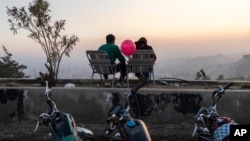Germany's and France’s foreign ministers said Friday that they made clear to Syria’s new de facto Islamic leader, Ahmad al-Sharaa, that the nation’s political transition should be inclusive and not based on Islamic fundamentalism if the country wants Europe’s support.
Germany's top diplomat, Annalena Baerbock, and her French counterpart, Jean-Noel Barrot, visited Damascus on behalf of the European Union to seek a new relationship between Europe and Syria and to push for a peaceful transition.
They were the first European ministers to visit Syria since al-Sharaa’s Hayat Tahrir al-Sham (HTS) rebels overthrew longtime Syrian President Bashar al-Assad last month.
In a statement ahead of the visit, Baerbock said she and her French counterpart were going to Syria to send a clear message to the nation on behalf of Europe: “A new political beginning between Europe and Syria, between Germany and Syria, is possible. With this outstretched hand, but also with clear expectations of the new rulers.”
Speaking to reporters following the talks, the German foreign minister followed up those words with a caveat: "Europe is prepared to offer support but Europe will not be a sponsor of new Islamist structures.”
Baerbock and Barrot met with members of Syrian’s civil society, including religious leaders, ahead of their meeting with al-Sharaa. The German foreign minister said she had heard from Syrians living in Germany and elsewhere, as well as Syrians in the region, and that they would come back and help rebuild their country only if they knew they and their families would be safe.
“A better future for Syria means an inclusive, peaceful transfer of power, reconciliation and reconstruction,” Baerbock said. “This requires a political dialogue involving all ethnic and religious groups, involving men and equally women. They all must be involved in the constitutional process and in a future Syrian government."
Baerbock said she and the French foreign minister encouraged Syrian leaders to seek the support and experience of the United Nations during this inclusive political process.
Baerbock was asked about the possibility of lifting long-standing EU sanctions against Syria, and she said that would depend on how the political process played out going forward.
Syria’s interim government is hoping to have Western sanctions, which were imposed on the Assad government, lifted, allowing it to seek international aid to rebuild vast areas of the country destroyed during its nearly 14-year civil war.
The EU and the United States have designated al-Sharaa’s HTS rebels a terrorist organization, and that designation has not yet changed. The U.S. did lift a $10 million bounty it had placed on al-Sharaa following talks with U.S. diplomats late last month.
Some information for this report came from The Associated Press, Reuters and Agence France-Presse.





